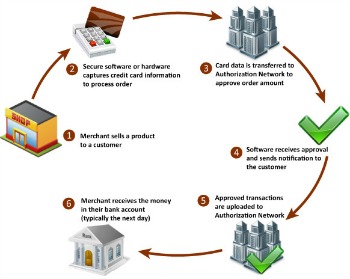Want to Save Money and Improve Cash Flow? Shop Around for Credit Card Processing Companies Once Per Year
How to Choose a Credit Card Processing Company
Original article posted by NerdWallet - written by Steve Nicastro May 8th, 2015
If your small business plans to accept debit and credit cards — whether in person, by phone or online — you’ll need to choose a credit card processing company to accept them. Although you’ll pay some upfront costs and ongoing credit card processing fees for doing so, going from a cash-only business to one that accepts credit and debit cards could lead to a big boost in sales. 
A study by Intuit estimates that businesses that don’t accept credit cards miss out on approximately $7,000 in sales each year, while a 2013 survey by the Federal Reserve says the number of debit card payments increased more than any other payment type from 2009 to 2012. And as mobile payment options such as Apple Pay soar in popularity with younger shoppers, your small business might want to adopt new technologies to meet the needs of your customer base.
However, choosing a credit card payment processor is not a simple task. Just as with any major financial decision, it’s wise to carefully compare the pros and cons of each of your options before signing a contract. Here are five important factors to consider.
1. How much are the fees and other costs? Credit card processing fees can be up to 5% on everything a company earns from its credit and debit card sales, according to the U.S. Small Business Administration. However, some companies might charge much less than others while offering the same products and level of service.
Here are some of the main credit card processing fees to look out for:
Interchange fees: This refers to a fee that is charged for every transaction you process, and it’s paid by the payment processor to the card-issuing bank. The rate you’ll pay for a transaction ultimately depends on several factors, including the type of card accepted (credit, debit or a rewards card), the type of transaction (if it’s done in store, by phone or online), and the size of each transaction (larger and fewer transactions result in lower fees). In-store transactions will cost you less in interchange fees, since the card is physically present, meaning there’s less risk of fraud.
Monthly statement fees: The credit card processing company might charge you monthly statement fees to cover the expense of mailing you a statement. It costs about $10 per month on average.
Application and setup fees: You may face a fee just for applying for the processing service. Setting up the equipment that’s necessary to accept credit cards may cost you extra, too. This fee can vary widely, depending on company.
Monthly minimum fee: This refers to a minimum amount in fees the processing company must collect in any one month. If you don’t meet or exceed this minimum amount, the processing company will charge you to meet the minimum. For example, the company’s monthly minimum fee may be $25; if your total credit card transaction fees one month are $20, the company will charge you $5 to make up the difference.
Monthly gateway access fee: Some processors may charge you this monthly fee for providing a payment gateway, which transmits transaction data from your processing system to the credit card companies. Monthly fees cost approximately $10 to $30.
Early termination fee: Some processors may charge you this fee for early cancellation of your contract. The fee can cost anywhere from a few hundred dollars to thousands.
As you can see, there are quite a few credit card processing fees your payments company may charge. It’s important to make sure you understand all the fees and service terms; if you have any questions or concerns, ask a company representative for an explanation. If they can’t provide you a detailed explanation on any costs or fees, it might be time to move on to the next processor.
2. How long will it take to set up? It should be easy for you and your employees to set up the processing technology. Find out how long the payment processor will take to set up your account and install the equipment so you can plan accordingly. If it seems like it might be a complicated task, make sure the processor can provide some support.
3. What are the accepted payment types? If you run a retail business, you might want to make sure the new payments processor accepts all major credit and debit cards so you don’t have to turn away any customers — after all, what’s worse than that? You might also want a system that accepts prepaid cards and gift cards, or an electronic benefit transfer, or EBT, depending on what type of business you operate.
4. Does it accept new payment technologies? Does your business have a lot of tech-savvy customers? If so, you might want a payments processor with near-field communication (NFC) technology, so you can accept digital wallets such as Apple Pay or Google Wallet. These devices allow customers to make purchases with a simple touch of their smartphone or tablets.
Apple Pay, for example, works with most major credit and debit cards and now accounts for two out of every three dollars processed through contactless payments.
5. How helpful is customer support? What if you run into technical problems with your credit card machine? Or you have questions about your monthly billing statement, such as confusing fees?
Hiring a payments processor that provides 24/7 customer support and direct help from an account representative can solve these issues. In addition, a helpful account representative should be able to explain any fees or costs you don’t understand. And in the end, it might be worth paying a little more in fees to avoid unreliable, confusing service for your small business.
Special Note:
There are dozens of credit card processing companies. You can look up accredited businesses in your area at the Better Business Bureau website, where you can also find out whether the company has had any customer complaints. Major banks such as Bank of America, Citibank, Chase and US Bank also offer merchant services.
If your business keeps you on the move, you may want to consider mobile credit card readers over traditional processors. These devices plug directly into a smartphone or tablet, so you can get paid by your customers anywhere you go and won’t need to purchase or lease an expensive credit card terminal. These devices could be particularly useful if, for instance, you sell goods at farmers markets, you’re a personal trainer who works at clients’ homes or you work out of a vehicle.
